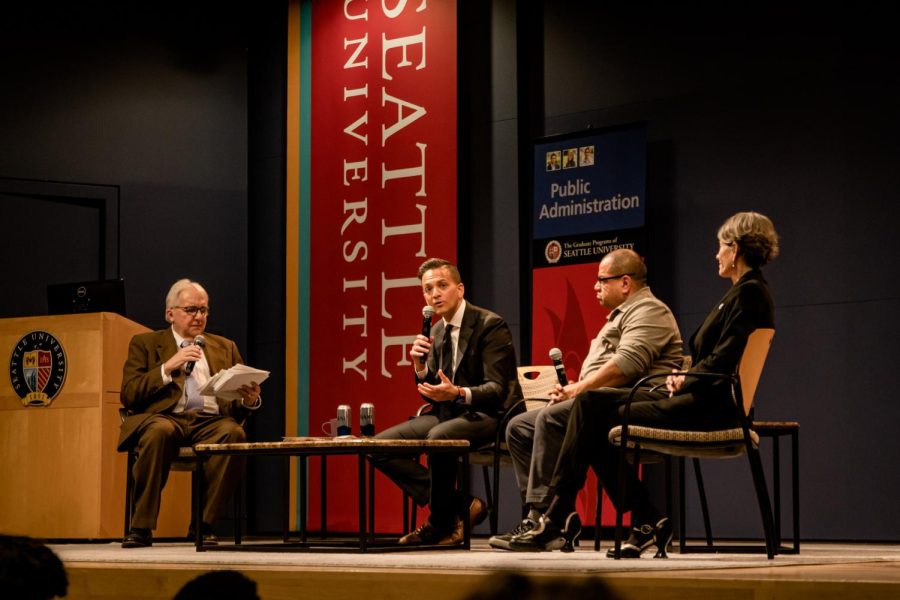City Officials Discuss Seattle’s Pressing Challenges
The Conversations series at Seattle University featuring Dr. Vin Gupta, Seattle Police Chief Adrian Diaz and Seattle City Council member Sara Nelson as they discuss anxiety and current issues.
Seattle’s notable political figures converged in Seattle University’s Pigott Auditorium last week to discuss today’s prominent issues facing the city.
Hosted by Seattle University’s Institute of Public Service (IPS), the latest installment of the “Conversations” series featured newly nominated Seattle Police Department (SPD) Chief Adrian Diaz, rookie City Councilmember and Chair of the Economic Development, Technology & City Light Committee, Sara Nelson, and public health physician Dr. Vin Gupta. The topic of the evening, “Anxiety Overload: Coping with the Pandemic, Public Safety and Declining Women’s Rights” found a small, but sympathetic audience.
Moderated by Seattle U IPS director Larry Hubbell, the panel gave new leaders a platform to articulate their approach to the city’s biggest issues.
With gun violence and homicides rising in Seattle and in many cities across the country, the elements undermining public safety were a central point of debate.
“When you talk about going after the root causes of violence—of social ills in general—I’m stuck on addiction and the attendant misdemeanor crimes that might be committed to support an addiction to the gun violence that is associated with the drug trade,” Nelson said to the audience.“We need to figure out a way we can do something to help people [who] are caught up in addiction [and] want to give it up but just don’t have access.”
Nelson noted that addiction is not the only cause of social ill, but proposals for other people in crisis remained unclear.
Diaz, who was named interim SPD Chief in Aug. 2020 and nominated for the position in late Sep. 2022, said he’s put extra emphasis on ebbing violent crime despite the dearth of SPD officers. At the panel, Diaz attributed a rise in aggravated assaults to inflamed imbalances in Seattle’s social ecosystem; issues that only worsened during the pandemic. Rising domestic violence disputes, shootings incited by road rage and violence stemming from Seattle’s “homeless nexus” are widening issues Diaz wants to confront as SPD chief. He’s also seeking to remedy longstanding problems within the SPD.
In March 2022, Diaz unveiled his Before the Badge (BTB) program which attempts to inculcate new SPD trainees into the communities they will eventually police. Recruits engage in community discussion, study the historical toll police wrought on disenfranchised neighborhoods and implement therapeutic practices to mitigate the mental health challenges of police work before defense and de-escalation training. With the addition of the BTB program, SPD now has the most extensive officer training program in the nation, according to Diaz.
“It’s a phenomenal program; it’s changing the way policing is done.” Brandon Bledsoe, a graduate student in the criminal justice program at Seattle U said. “Police are getting the history of marginalization in communities and how policing has impacted those communities.”
Despite these reforms, the SPD is still under a 2012 federal consent decree for repeated use of force violations. On stage, Diaz noted that use of force cases have significantly decreased since 2012, particularly among people in crisis. Diaz believes extensive crisis training accounted for most of this drop. As more SPD trainees participate in crisis and BTB training, supporters anticipate measurable changes to department culture.
“Police have been the chief oppressor since the beginning of this nation, and most officers don’t realize that.” Al O’Brien, former SPD sergeant and assistant professor of Criminal Justice at Seattle U said. “That’s why Before the Badge is so important.”
According to Diaz, the biggest challenge facing the SPD is the shortage of deployable personnel. A fully operational department needs 1,400 officers, but in Feb. 2022 SPD had fewer than 1,000. Diaz and Nelson found a significant link between the understaffed SPD, widespread concern over personal safety and downtown’s stilted return to pre-pandemic activity.
The perennial concentration of criminalized activity on Third Ave. and Pine St. represents a lack of brick-and-mortar business and police paucity, according to Nelson., Nelson said the city needs to do more to facilitate storefront interests and shopper security. The recently passed Storefront Repair Fund, which offers grants of up to $2,000 for small business owners looking to repair private property, was critiqued by Nelson as insufficient and available only to small businesses. Instead, Nelson proposed more substantial investments.
“How about a concerted effort to recruit businesses to come to Seattle, especially along Third Ave.?” Nelson said. “Having a fully staffed police force is extremely necessary for public safety, but there are also things we could do to incentivize businesses coming back.”
How this program would address people living, sleeping and engaging in criminalized forms of work in areas like Third Ave. went unexamined.
Many scholars, journalists and public officials have noted that in order to fully address the complex issues facing Seattle and cities across the nation, public officials need to think in broad terms by incorporating nontraditional, nuanced approaches to public safety, housing and health.
“It was a privilege to be with leaders in Seattle, in a city that I think leads the country on so many of these prominent issues of the day,” Dr. Gupta said after the panel.


